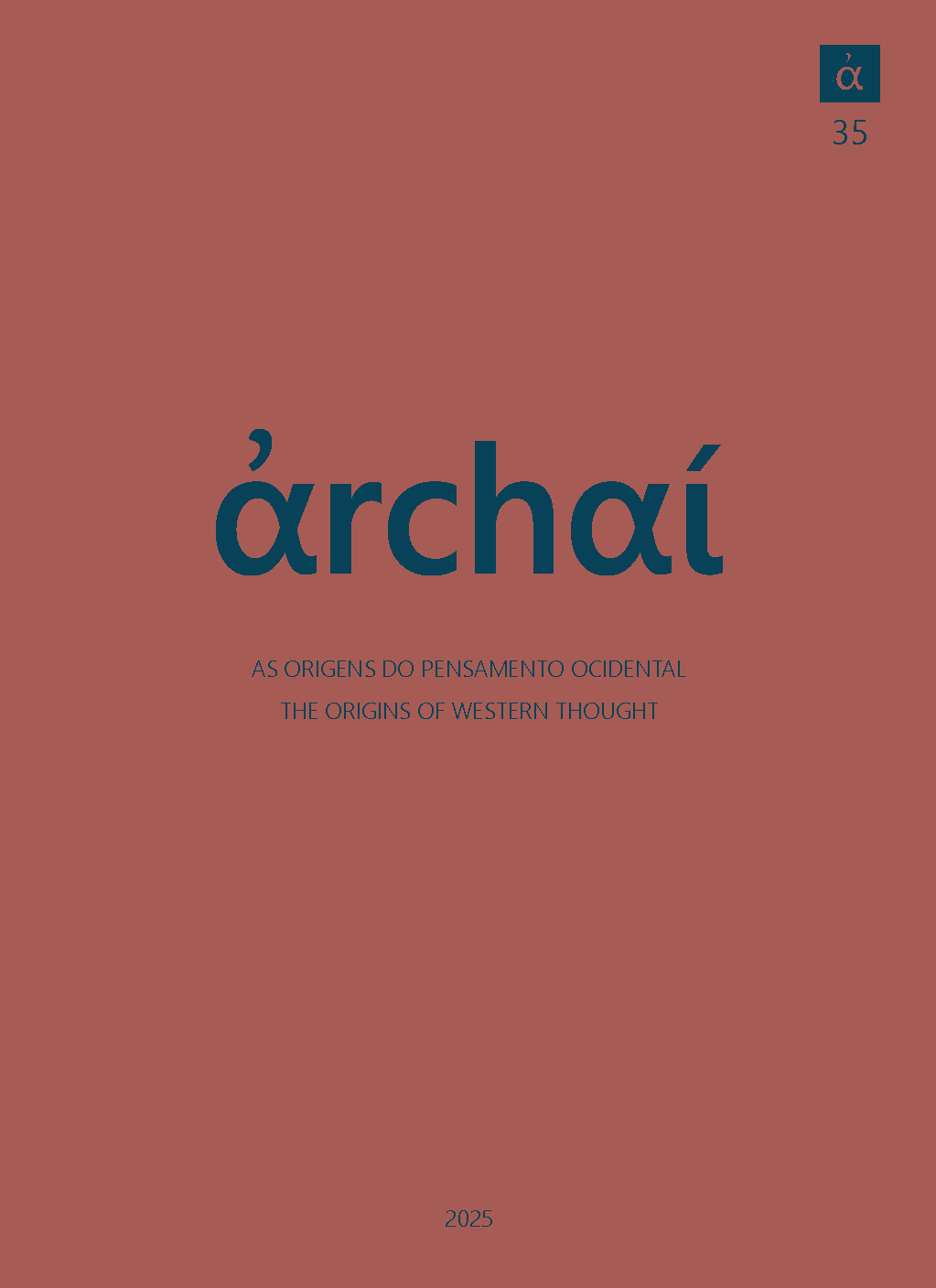Lessons of love in Achilles Tatius: commentary, translation and notes by Leucippe and Clitophon I.7-15
DOI:
https://doi.org/10.14195/1984-249X_35_04Keywords:
Ancient novel, Achilles Tatius, translation, erotic elegyAbstract
We presente the trnaslation of a specific passage from the novel Leucippe and Clitophon, by Achilles Tatius: the scene in which the main character goes to meet his cousin Clinias and receives from him valuable teachings on seduction. This passage draws our attention because it dialogues with Roman erotic elegy, especially Ovid's Ars Amatoria, and because of its concise, unitary structure, which resonates like a short story within the novel. We have sought to recreate in our translation aesthetic and literary elements that resonate with these elements, especially the dynamism of the narrative, without losing the lyrical - or elegiac - nuances of the text.
Downloads
References
ÁLVARES, J. (2006). Reading Longus’ Daphnis and Chloe and Achilles Tatius’ Leucippe and Clitophon in counterpoint. In: BYRNE, S. N.; CUEVA, E.; ALVARES, J. (eds). Authors, Authority, and Interpreters in the Ancient Novel: Essays in Honor of Gareth L. Schmeling Ancient Narrative Supplementum 5. Groningen, 2006, p. 1-33.
BARTSCH, S. (1989). Decoding the ancient novel: the reader and the role of description in Heliodorus and Achilles Tatius Princeton, Princeton University Press.
BERMAN, A. (2007). A tradução e a letra ou o Albergue do longínquo Trad. M-H. C. Torres , M. Furlan e A. Guerini . Rio de Janeiro, 7Letras/PGET.
BILLAUT, A. (1998). Le comique d' Achille Tatius et les réalités de l'époque impériale. In: HOFFMANN, P.; TRÉDÉ, M.; AUVRAY-ASSAYAS, C. (eds.). Le rire des anciens. Études de Littérature Ancienne (Tome 8). Paris, Éditions Rue d'Ulm, p.143-158.
BRETHES, R. (2017). Clitophon lecteur d’Ovide. In: BIRAUD, M.; BRIAND, M. (eds). Roman grec et poésie: dialogue des genres et nouveaux enjeux du poétique (Actes du colloque international, Nice, 21-22 mars 2013). Lyon, Maison de l’Orient et de la Méditerranée, p.133-148.
CHEW, K. (2000). Achilles Tatius and parody. The Classical Journal 96, n. 1, p. 57-70.
CHEW, K. (2014). Achilles Tatius, Sophistic Master of Novelistic Conventions. In: CUEVA, Edmund P.; BYRNE, Shannon N. (eds.). A Companion to the Ancient Novel Oxford: Wiley; Blackwell, p.62-75.
CRISTÓBAL LOPEZ, V. (1989). Introdución. In: OVÍDIO. Amores; Arte de Amar; Sobre la cosmética del rostro feminine; Remedios contra el amor Tradución, introdución y notas de V. Cristóbal Lopez. Madrid, Gredos, p.7-186.
DURHAM, B. (1938). Parody in Achilles Tatius. Classical Philology, 33, n. 1, p. 1-19.
GOLDHILL, S. D. (1995). Foucault’s Virginity: Ancient Erotic Fiction and the History of Sexuality. New York/Cambridge, Cambridge University Press.
JOLOWICZ, D. (2021). Latin Poetry in the Ancient Greek Novels Oxford, Oxford University Press.
JONES, M. (2012). Playing the Man: Performing Masculinities in the Ancient Greek Novel Oxford, Oxford University Press .
KONSTAN, D. (1994). Sexual Symmetry: Love in the Ancient Novel and related genres Princeton, Princeton University Press .
LAFER, M. de C. (1996). Hesíodo. Os trabalhos e os dias Tradução, introdução e notas. São Paulo, Iluminuras.
MORALES, H. (2004). Vision and narrative in Achilles Tatius’ Leucippe and Clitophon Cambridge, Cambridge University Press.
NUNES, C. A. (ed.). (1964). Homero. Ilíada São Paulo, Ed. Melhoramentos.
O'SULLIVAN, J.N. (1978). Notes on the text and interpretation of Achilles Tatius I. Classical Quartely 28, n. 2, p. 312-329.
PAES, J. P. (1990). Sob o signo de Judas: digressões de um tradutor de Sterne. In: PAES, J. P. (ed.). A tradução: a ponte necessária. Aspectos e problemas da arte de traduzir. São Paulo, Ed. Ática, p. 91-102.
PAGLIALUNGA, E. (2005). El Ars amandi en la novela de amor griega. Florentia Iliberritana 16, p. 255-274.
PEARCY, L. T. (1978). Achilles Tatius, Leucippe and Clitophon 1.14-15: an unnoticed lacuna? Classical Quarterly 73, n. 2, p. 233-35.
PENA, A. N. (2005). Introdução. In: PENA, A. N. Aquiles Tácio. Os amores de Leucipe e Clitofonte (tradução, introdução e notas). Lisboa, Edições Cosmos, p. XXIII-LXVII.
PLEPELITS, K. (1996). Achilles Tatius. In: SCHMELING, G. (ed.). The Novel in the ancient World Leiden/New York/Köln, Brill, p.387-416.
REEVES, B. T. (2007). The Role of the Ekphrasis in Plot Development: The Painting of Europa and the Bull in Achilles Tatius' "Leucippe and Clitophon". Mnemosyne 60, n. 1, p.87-101.
SANO, L. (2022). Eros Marcial em Leucipe e Clitofonte, de Aquiles Tácio. Classica 35, n. 2, p.1-11.
VILBORG, E. (ed.) (1955). Achilles Tatius: Leucippe and Clitophon Studia Graeca et Latina Gothoburgensia I. Stockholm, Almqvist & Wiksell.
WHITMARSH, T. (2003). Reading for pleasure: narrative, irony and erotics in Achilles Tatius. In: PANAYOTAKIS, S. et al. (eds.). The Ancient Novel and Beyond Leiden/Boston, Brill, p. 191-205.
WHITMARSH, T. (2000). Commentary. In: WHITMARSH, T. (ed.). Achilles Tatius. Leucipe and Clitophon Book I-II. Cambridge, Cambridge University Press , p.117-262.
Downloads
Published
How to Cite
Issue
Section
License
Copyright (c) 2025 Emerson Cerdas

This work is licensed under a Creative Commons Attribution 4.0 International License.
Given the public access policy of the journal, the use of the published texts is free, with the obligation of recognizing the original authorship and the first publication in this journal. The authors of the published contributions are entirely and exclusively responsible for their contents.
1. The authors authorize the publication of the article in this journal.
2. The authors guarantee that the contribution is original, and take full responsibility for its content in case of impugnation by third parties.
3. The authors guarantee that the contribution is not under evaluation in another journal.
4. The authors keep the copyright and convey to the journal the right of first publication, the work being licensed under a Creative Commons Attribution License-BY.
5. The authors are allowed and stimulated to publicize and distribute their work on-line after the publication in the journal.
6. The authors of the approved works authorize the journal to distribute their content, after publication, for reproduction in content indexes, virtual libraries and similars.
7. The editors reserve the right to make adjustments to the text and to adequate the article to the editorial rules of the journal.














